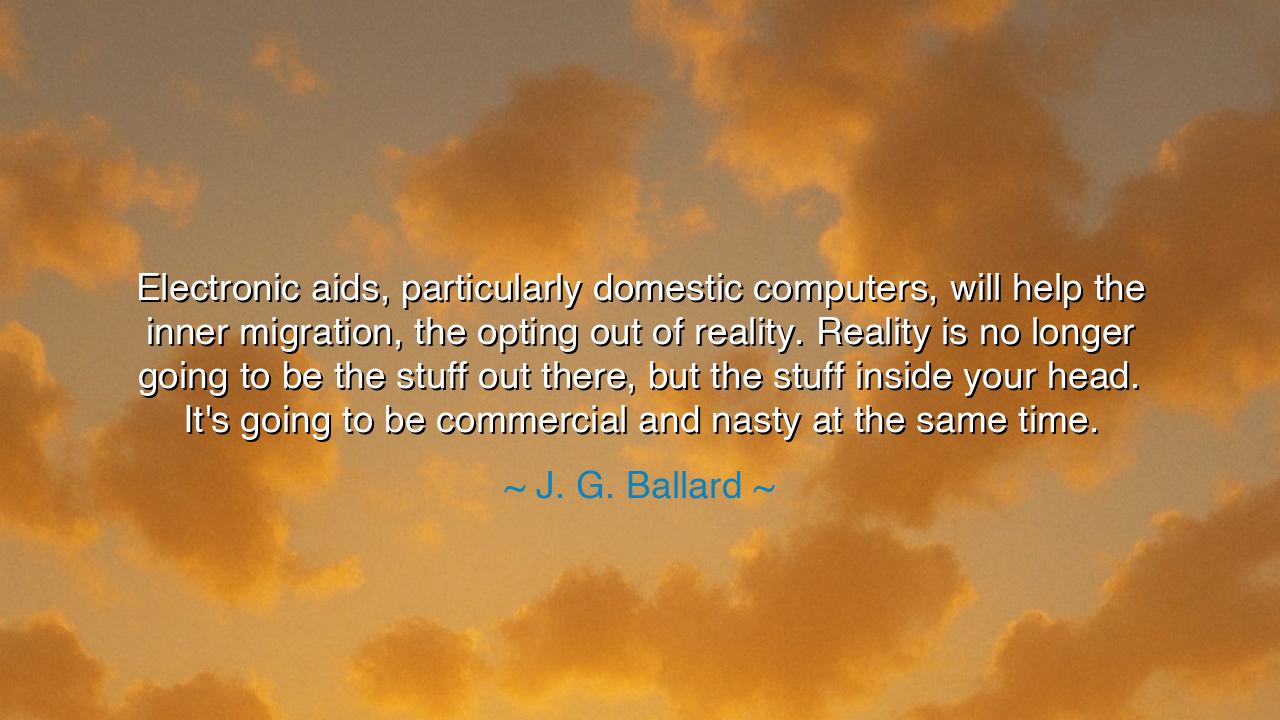
Electronic aids, particularly domestic computers, will help the
Electronic aids, particularly domestic computers, will help the inner migration, the opting out of reality. Reality is no longer going to be the stuff out there, but the stuff inside your head. It's going to be commercial and nasty at the same time.






In the swirling tides of human progress, there are those who stand as prophets, peering into the future with clarity and foresight. J. G. Ballard is one such visionary, whose words, "Electronic aids, particularly domestic computers, will help the inner migration, the opting out of reality. Reality is no longer going to be the stuff out there, but the stuff inside your head. It's going to be commercial and nasty at the same time," resonate like an ancient oracle’s warning. These words reflect a world in which the boundaries between the external world and the inner world of the mind are becoming increasingly blurred—a world where technology promises freedom but often delivers isolation.
To understand Ballard’s foresight, we must turn to the ancient Greeks, who pondered the nature of reality and the human perception of the world. The philosopher Plato, in his Allegory of the Cave, spoke of prisoners bound in a dark cave, only able to see the shadows of the outside world cast on the walls. For them, those shadows were reality. Yet, when one prisoner escaped and ventured into the light, he realized that the shadows were mere illusions, not the true form of existence. Ballard’s words echo this allegory, suggesting that in the future, our understanding of reality will be distorted by the very technologies that we believe will set us free. Electronic aids will give us the power to create our own worlds inside our minds, but these worlds will be constructed and shaped by commercial interests, leaving us imprisoned by the very tools that promise to liberate us.
The Romans, too, were familiar with the tension between the real and the illusion. In their vast empire, entertainment was often a means of distraction—gladiatorial games and public spectacles kept the masses occupied, their minds diverted from the hardships of daily life. The ancient coliseum, with its brutal contests, served as a place where the real world was overshadowed by the created drama of the arena. Similarly, Ballard’s warning speaks of a future where real life is overshadowed by the commercialized experiences created within the digital realm, leaving us disconnected from the world outside and trapped within our own created realities.
The rise of technology has always been entwined with human ambition. In the early days of the Industrial Revolution, machines promised freedom from the toil of manual labor. Yet, the reality was that these machines often imprisoned workers in factories, stripping them of their connection to the natural world. Ballard's statement about domestic computers and their potential to foster an inner migration is an echo of this historical pattern—technology that promises to enhance our lives may instead lead us into a prison of the mind, where we retreat from the world around us into carefully curated, commercialized spaces within our own heads. The illusion of control becomes the reality of isolation.
Consider the television, a technology that began as a beacon of possibility. In the 20th century, it brought the world into our homes, offering glimpses of other cultures, distant lands, and lives different from our own. Yet, over time, television became a tool of commercialism, serving as a constant stream of advertisements and manipulated narratives. What was once a window into the world became a screen that confined us to a narrow, carefully constructed view of reality. Ballard’s vision of computers as the next step in this evolution suggests that technology will not only reshape our perceptions of the world but will ultimately detach us from the physical world, replacing it with a simulated version of reality driven by capitalism and consumerism.
In our own time, we see this dynamic at play. The internet, once heralded as a vast space for free exchange of ideas, is now dominated by powerful corporations that dictate the flow of information and shape the experiences of users. Social media platforms, once tools of connection, now serve as vehicles for advertisements, manipulating our desires and emotions to sell products. Ballard’s warning of a commercial and nasty inner world is a direct reflection of this ongoing shift—a shift in which technology becomes the means of both escape and entrapment.
The lesson we must take from Ballard’s prophecy is one of awareness. In the pursuit of convenience and personal control, we must ask ourselves: Are we truly free, or are we merely trading one form of confinement for another? As we move deeper into the digital age, we must be cautious not to lose touch with the external world, the natural world, and the authentic connections that make us human. Technology should serve us, not isolate us; it should enhance our understanding of reality, not replace it. As we build new worlds within our minds, let us not forget the world that exists beyond the screen, waiting to be explored, experienced, and lived.
In our daily lives, let us strive for a balance between the inner world of the mind and the outer world of reality. Let us use technology not as a means of escape but as a tool to enhance our understanding and connection to the world around us. The true challenge of the future will not be to retreat inward but to find a way to integrate the virtual and the real, forging a future where technology enhances our humanity, rather than diminishing it. The journey ahead is one of both caution and hope—caution to avoid the traps of illusion, and hope that we can use technology to create a future that is grounded in truth, connection, and purpose.






AAdministratorAdministrator
Welcome, honored guests. Please leave a comment, we will respond soon